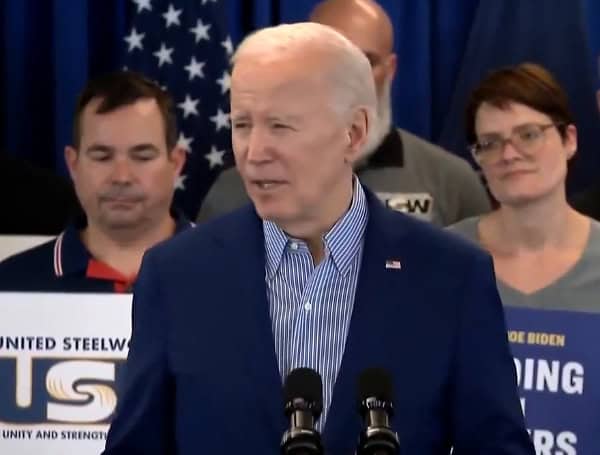After an all-night bargaining session, the House of Representatives passed the “One Big Beautiful Bill Act” in the wee hours of Thursday morning on a mainly party-line vote.
“It quite literally is again Morning in America,” House Speaker Mike Johnson said on the House floor following the vote. “After four long years of President Biden’s failures, President Trump’s America first agenda is finally here.”
Among many key provisions where energy is concerned, the bill eliminates subsidies for wind and solar installations contained in the Orwellian Inflation Reduction Act (IRA) of 2022 faster than previous versions would. The previous bill draft would have phased them out starting in 2029.
READ: Florida Sen. Scott Aims To Slam Shut U.S. Court Door On Chinese Military-Linked Firms
The new version eliminates them in full at the end of 2026 – any proposed projects not permitted by that time would become ineligible for the credit. Projects that meet the permitting deadline would have to begin generating electricity no later than the end of 2028 or face elimination of their subsidies.
Naturally, boosters of intermittent, unreliable electricity generation from wind and solar installations immediately rolled out messaging claiming that the elimination of the subsidies would spell an end to their industry’s growth in the United States, a claim that may well be accurate.
What they don’t seem to realize is that by using these talking points, they are admitting that their industry lacks a business case for continued expansion. Any business model that cannot survive without taking in an unending stream of government rents is a business model that deserves to fail.
The significance of the prospective elimination of the IRA credits was starkly illustrated by big data and analysis firm Enverus in a report released in early May, its “2025 Interconnection Queue Outlook.” In that report, Enverus details the critical impact those subsidies have had on the rapid growth of wind and solar since 2022, while also resulting in huge backup queue for interconnection in the various U.S. regional power grids.
READ: Trump’s ‘One Big, Beautiful Bill’ Hits Senate Gauntlet As GOP Divisions Deepen
Enverus’s researchers point out that “generous tax credits from the Inflation Reduction Act and the EPA’s update to 40 CFR Part 60, which mandates additional coal retirements, have significantly boosted demand for renewable energy projects across the United States.” Indeed, the “surge in investment and development” in the past three years has been so substantial that it “has overwhelmed interconnection queues, with a record number of projects seeking grid connections.”
This reality has created a situation in which developers of proposed wind and solar arrays must often wait in line for years before being approved for grid interconnection. As a result, Enverus finds that “[o]nly a fraction of capacity in the interconnection queues are expected to reach operation.” The company’s gradient-boosting machine learning model estimates that just “~10% of projects will successfully come online in the next three years.”
If Enverus’s analysis is right – and the company has a strong track record – just 10% of the projects already in the queue will be able to meet the end-of-2028 deadline contained in the House bill passed Thursday. This reality would essentially eliminate any hope that projects planned to be permitted in future years could benefit from the IRA largesse.
READ: ‘Not Merit, But Race’ Says Virginia Gov. Youngkin, As Feds Launch Title VI Investigation
The same House bill passed Thursday also enhances the ability for new nuclear projects to access the IRA’s enhanced investment tax credit. The IRA only allowed access to the credit for nuclear projects once they begin delivering electricity as the Biden administration and Democrat congress of 2022 strove to disadvantage all alternatives to their client renewables industries. The new House version would allow such projects to access the tax credit immediately upon start of construction, a provision strongly preferred by Energy Secretary Chris Wright.
In an exchange with Tennessee Republican Sen. Bill Hagerty on Wednesday, Wright told the Senate Appropriations Subcommittee on Energy and Water Development that nuclear is “the critical technology that could scale wildly beyond where it is today, which is just electricity production into huge scale…I am all in with you on advancing nuclear…Nuclear is the [energy source] that could burst through.”
Where energy is concerned, the One Big Beautiful Bill Act presents a nod to the realities of a dramatically changed political landscape, and to the fact that the energy alternatives favored by the previous administration won’t do the job. Elections do still matter in America.
David Blackmon is an energy writer and consultant based in Texas. He spent 40 years in the oil and gas business, where he specialized in public policy and communications.
Please make a small donation to the Tampa Free Press to help sustain independent journalism. Your contribution enables us to continue delivering high-quality, local, and national news coverage.
Connect with us: Follow the Tampa Free Press on Facebook and Twitter for breaking news and updates.
Sign up: Subscribe to our free newsletter for a curated selection of top stories delivered straight to your inbox.
